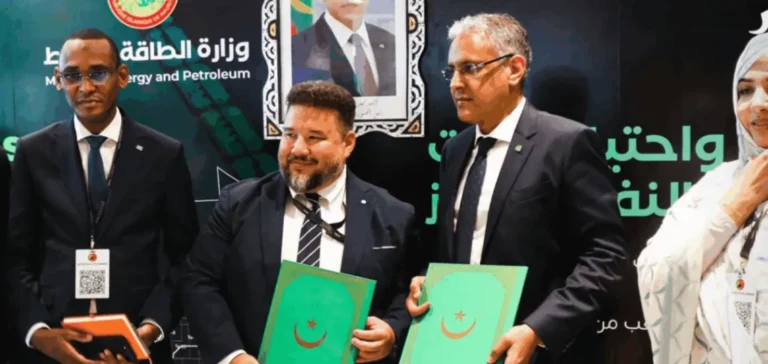Hynfra PSA has signed a framework agreement with the Mauritanian government to develop an industrial project aiming to produce 100,000 tonnes of green ammonia annually by 2030. The agreement, formalised in Nouakchott during the MAURITANIDES 2025 conference, marks a decisive step after the memorandum of understanding signed in 2024. Mauritania Green Ammonia SARL, a special-purpose entity created for this investment, will oversee the development.
A strategic investment for export
The production site will be located in the southern zone of the Somelec wind farm, near the capital. The ammonia will be exported through Port de l’Amitié, the country’s main maritime terminal. The project relies entirely on local renewable resources, combining solar and wind power to supply the electrolysers required for hydrogen synthesis, the base component of green ammonia.
The planned investment includes the construction of photovoltaic and wind farms, electrolysis units, an ammonia production plant, as well as supporting infrastructure such as desalination plants, energy storage facilities, and port equipment. The capital expenditure is estimated at $1.5bn, according to the agreement.
Regulatory framework and implementation schedule
The project is based on the Mauritanian Hydrogen Code, adopted in 2024, a regulatory framework described as one of the most advanced globally. It provides foreign investors with structured conditions for project development, including clear rules on permitting, land use, and exports.
The schedule foresees feasibility studies in 2025 and 2026, followed by the Front-End Engineering Design (FEED) phase, environmental assessments, and permitting procedures between 2027 and 2028. Construction is expected to begin afterwards, with commercial operations targeted for 2030.
Competitive positioning in Mauritania
With this agreement, Hynfra PSA joins a select group of international operators already active in synthetic fuel projects in Mauritania. These include TotalEnergies, Masdar, GM Hydrogen, Chariot, and CWP Global, all pursuing similar initiatives integrating green hydrogen and its derivatives.
Mauritania Green Ammonia SARL has been designed as a joint venture with a local partner, strengthening the value chain within Mauritania. The ammonia produced is intended to supply both the domestic market and industrial clients in Europe, amid rising demand for decarbonised molecules.






















